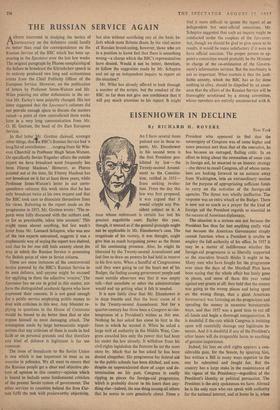THE RUSSIAN SERVICE AGAIN
NYONE interested in studying the tactics of nkbureaucracy on the defensive could hardly do better than read the correspondence on the Russian Service of the BBC which has been ap- pearing in the Spectator over the last few weeks. The original paragraph by Pharos complaining of the failure to broadcast the Khrushchev speech in its entirety produced two long and acrimonious letters from the Chief Publicity Officer of the European Service. However, on the publication of letters by Professor Seton-Watson and Mr. Wiles pointing out other deficiencies in the ser- vice Mr. Earley's tone palpably changed. His last letter suggested that the Spectator's columns did not provide enough space to discuss the matters raised—a point of view contradicted three weeks later in a very long communication from Mr. G. H. Gretton, the head of the East European Service.
In that letterXr. Gretton claimed, amongst other things, thaiMe BBC's Russian Service had 'a long list of contributors ... ranging from Sir Win- ston Churchill to Professor Hugh Seton-Watson. On specifically Soviet-Yugoslav affairs the outside expert we have broadcast most frequently has been Fitzroy Maclean.' However, as Pharos pointed out at the time, Sir Fitzroy Maclean has not broadcast on it for at least three years, while Professor Seton-Watson's letter in our corre- spondence columns this week states that he has only broadcast twice at his own request and that the BBC took care to dissociate themselves from his views. Referring to the report made on the programme in 1953, Mr. Gretton wrote : 'The re- ports were fully discussed with the authors and, so far as practicable, taken into account.' This might mean almost anything, but last week's letter from Mr. Leonard Schapiro, who was one of the two experts concerned, suggests it was a euphemistic way of saying the report was shelved, and that he for one still feels anxiety about the way in which the Russian Service is presenting the British point of view to Soviet citizens.
These are some instances of the controversial tactics pursued by the BBC's Russian Service in its own defence, and anyone might be excused for applying to them the adjective 'evasive.' The Spectator has no axe to grind in this matter, nor have the distinguished academic figures who have expressed their concern. It is not good enough for a public service employing public money to deal with criticism in this way. Any Minister re- plying to questions in the House of Commons would be bound to do better than that or else expose himself to most damaging attack. The assumption made by large bureaucratic organi- sations that any criticism of them is made in bad faith or on personal grounds and that therefore any kind of defence is legitimate is far too common.
The issue of broadcasts to the Soviet Union is one which is too important to treat as an exercise in polemics. We all want to ensure that the Russian people get a clear and objective pic- ture of opinion in this country—opinion which is bound to include some fundamental criticism of the present Soviet system of government. The other services to countries behind the Iron Cur- tain fulfil the task with praiseworthy objectivity, but also without sacrificing any of the basic be- liefs which most Britons share. In the vital sector of Russian broadcasting, however, those who are in a position to know feel that there is something wrong—a charge which the BBC's representatives have denied. Would it not be better, therefore, to follow the suggestion made by Mr. Schapiro and set up an independent inquiry to report on the situation?
Mr. Wiles has already offered to look through a number of the scripts, but the conduct of the BBC so far does not give one confidence that it will pay much attention to his report. It might find it more difficult to ignore the report of an independent but semi-official committee. Mr. Schapiro suggested that such an inquiry might be conducted under the auspices of the Spectator; but, though we should be glad to give space to its results, it would be more satisfactory if it were to have official sanction. The proper person to ap- point a committee would probably be the Minister in charge of the co-ordination of the Govern- ment's information services. But the machinery is not so important. What matters is that the justi- fiable anxiety, which the BBC has so far done nothing to allay, should be dispelled by an assur- ance that the affairs of the Russian Service will be thoroughly scrutinised by a strong committee, whose members are entirely unconnected with it.






























 Previous page
Previous page